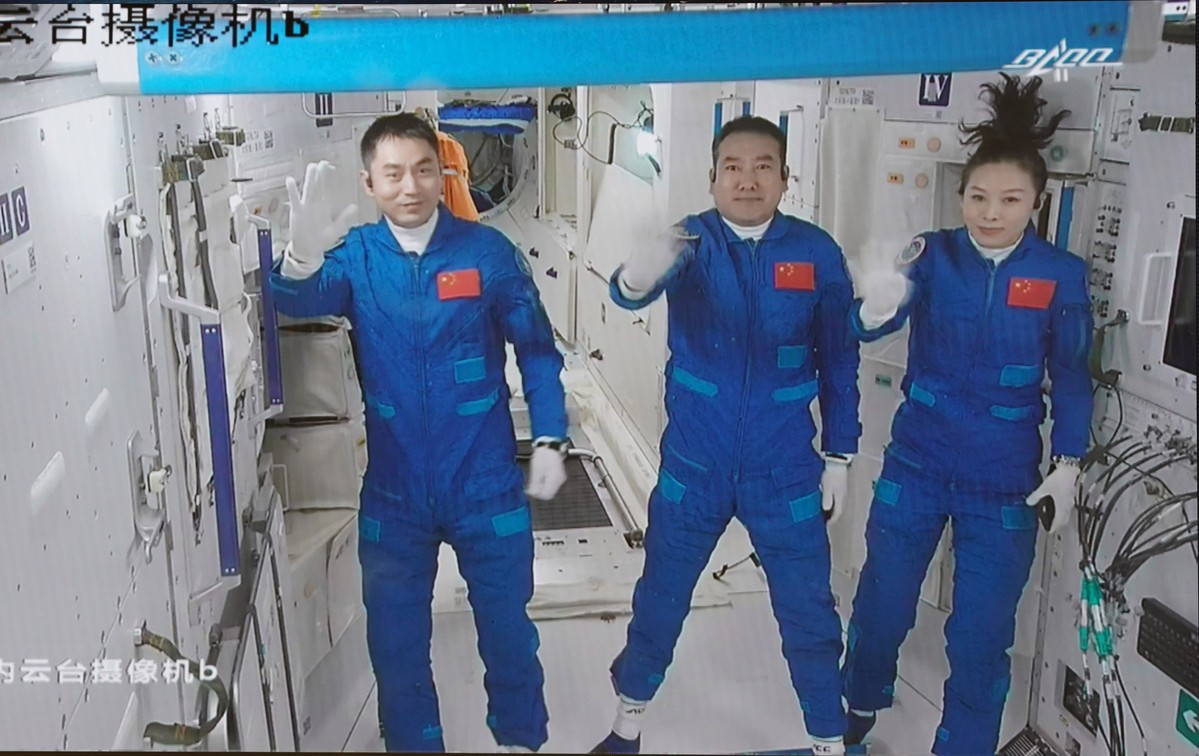Crew to offer live lecture from China's orbiting space station


Heavenly Palace Class to be broadcast live around the globe in coming days
Crew members of China's Shenzhou XIII mission will soon give a space-based lecture from the orbiting Tiangong space station to students around the world, the China Manned Space Agency said on Thursday.
It said the lecture will take place in the coming days and will be broadcast live to audiences around the globe. It will mark the launch of the Heavenly Palace Class, China's first extraterrestrial lecture series to popularize space science, it added.
Heavenly Palace is the English translation of Tiangong, the most sophisticated endeavor in China's manned space program, which aims to build a massive space station about 400 kilometers above Earth.
The Heavenly Palace Class lectures will be based on the country's manned spaceflights and will be presented by Chinese astronauts. Featuring interactive teaching, the activities will be mainly targeted at youngsters.
The statement issued by the agency on Thursday did not mention which member of the crew-Major General Zhai Zhigang, Senior Colonel Wang Yaping and Senior Colonel Ye Guangfu-will host the lecture, but Lin Xiqiang, the agency's deputy director, told a news conference in mid-October, right before Shenzhou XIII's launch, that "Teacher Wang will soon bring her second space lecture to you."
In June 2013, Wang took part in the Shenzhou X mission that lasted nearly 15 days. During that mission, she carried out the nation's first space-based lecture inside an experimental space station module to more than 60 million Chinese students. The activity made China the second country, following the United States, to have held a space-based class for students.
The agency said that as a national space-based laboratory, the Tiangong station is also tasked with promoting and propagating science and technology knowledge. The orbiting outpost has abundant, unique educational resources and boasts special advantages when it comes to encouraging the public, especially young people, to embrace science and space exploration, it said.
Members of the public are welcome to submit questions, suggestions or requests for the kind of content they would like to see shared through the lectures, the agency said, adding that they can contact it via its media partners or its own website.
Wang Yanan, editor-in-chief of Aerospace Knowledge magazine, said the Heavenly Palace Class will inspire more young people to study science and technology and explore the universe and will arouse a sense of patriotism among them.
"I think the astronauts will display the space station and their scientific experiments to the students, and will show some interesting physical phenomena to them," he said.
The Shenzhou XIII mission was launched on Oct 16 by a Long March 2F carrier rocket that blasted off from the Jiuquan Satellite Launch Center in northwestern China's Gobi Desert, with the crew soon entering the Tiangong station. They are scheduled to spend six months working in the station, making it China's longest manned space mission.
Early last month, Wang Yaping, 41, became China's first female spacewalker when she took part in the Shenzhou XIII mission's first extravehicular activity.
- A glimpse of Xi's global insights through maxims quoted in 2024
- China's 'Ice City' cracks down on ticket scalping in winter tourism
- Iron stick yams revitalize Wenxian county
- Party chief of Guilin under investigation
- Two radio telescopes put into use to support deep space exploration
- Joint action transforms Mekong region




































